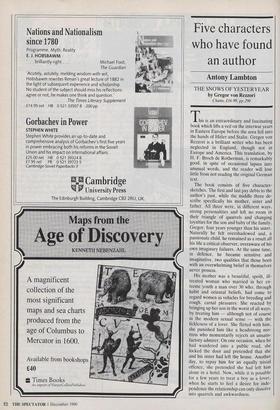Five characters who have found an author
Antony Lambton
THE SNOWS OF YESTERYEA R by Gregor von Rezzori Chatto, £16.99, pp.290 his is an extraordinary and fascinating book which lifts a veil on the interwar years in Eastern Europe before the area fell into the hands of Hitler and Stalin. Gregor von Rezzori is a brilliant writer who has been neglected in England, though not in Europe and America. This translation, by H. F. Broch de Rotherman, is remarkably good, in spite of occasional lapses into unusual words, and the reader will lose little from not reading the original German text.
The book consists of five character- sketches. The first and last pay debts to the author's past, while the middle three de- scribe specifically his mother, sister and father. All three were, in different ways, strong personalities and left no room in their triangle of quarrels and changing loyalties for the son and baby of the family, Gregor, four years younger than his sister. Naturally he felt overshadowed and, a passionate child, he remained as a result all his life a critical observer, overaware of his own imaginary failures. At the same time, in defence, he became sensitive and imaginative, two qualities that those born with an overwhelming belief in themselves
never possess. _ His mother was a beautiful, spoilt, ill- treated woman who married in her ex- treme youth a man over 30 who, through habit and oriental beliefs, had come to regard women as vehicles for breeding and rough, carnal pleasures. She reacted by bringing up her son in the worst of all ways, by treating him — although not of course in the modern sexual sense — with the fickleness of a lover. She flirted with him. she punished him like a headstrong mis- tress who momentarily rejects an unsatis- factory admirer. On one occasion, when he had wandered into a public road, she locked the door and pretended that she and his sister had left the house.. Another day, to repay him for an equally trivial offence, she pretended she had left him alone in a hotel. Now, while it is possible for a few years to treat a boy as a lover, when he starts to feel a desire for inde- pendence the relationship can only dissolve into quarrels and awkwardness. Despite his mother's faults she had charm and could suddenly by laughter erase all her unkindnesses — behaviour that can only have added to her son's confusion, which was compounded by that of his sister. A girl of great beauty who died at the age of 21, she treated her brother as a toy and, in an incident reminiscent of Chekhov, Gregor gives a glimpse of her teasing, arrogant playful- ness. He was standing helplessly confused before a mirror, his shoes unlaced, his tie entangled as he struggled in vain with incomprehensible knots. She came up be- hind him and he saw her, in reflection, undo her hair, shake it, gather it up and put it in place with a neatly tied bow. She gave him a little smile of unforgettable triumph before walking away, leaving him in his sad state.
Her effect on Rezzori was profound.
She has been dead for 56 years and not one of those years has gone by without her being close to me in an almost corporeal way — not In the abstract sense of a lovingly preserved memory, but in a well-nigh physical pre- sence, often anything but welcome. What- ever I do or fail to do, whatever happens to me, she stands constantly in front of me, next to me, behind me, observing; at times I even call to her to make sure she's there. For 56 years — a whole lifespan — there has not been for me a single happy or unhappy moment, neither success nor failure, no significant or even halfway noteworthy occurence on which she might not have commented.
Clearly she had woven `a circle round him thrice'. The passage is one of the oddest, most touching epitaphs to a sister I have ever read.
Lastly there was the dominant figure of Gregor's father, half bete humaine, half Intellectual, a scholar and eminent natural- ist and administrator of a quarter of a million acres of forest on the eastern borders of Roumania. He had the morals and appearance of a Roman emperor and It never entered his head that anything he said was wrong or that he was not the only trustworthy judge in the world. A huge, entirely bald man, he enjoyed exciting his Jealous dogs to eat with disgust the shaving soap full of bristles he would flick at them from his English cut-throat razor, an action which expressed his view of the necessity of keeping those who loved him in their place. The adolescent Rezzori, staying with his father in his forest, was made to sit silent, forbidden to move, as they waited for some rare animal or bird, while mos- quitoes and bugs feasted on his bare legs. When he finally made his bid for freedom, his father, who could only bear subservi- ence, withdrew from him.
Rezzori, now in his seventies, had the last word, for this book is a work of art and will be an endless delight to the discerning. But having laid the ghosts of those who have haunted him for a lifetime, who will he write about next?











































































 Previous page
Previous page